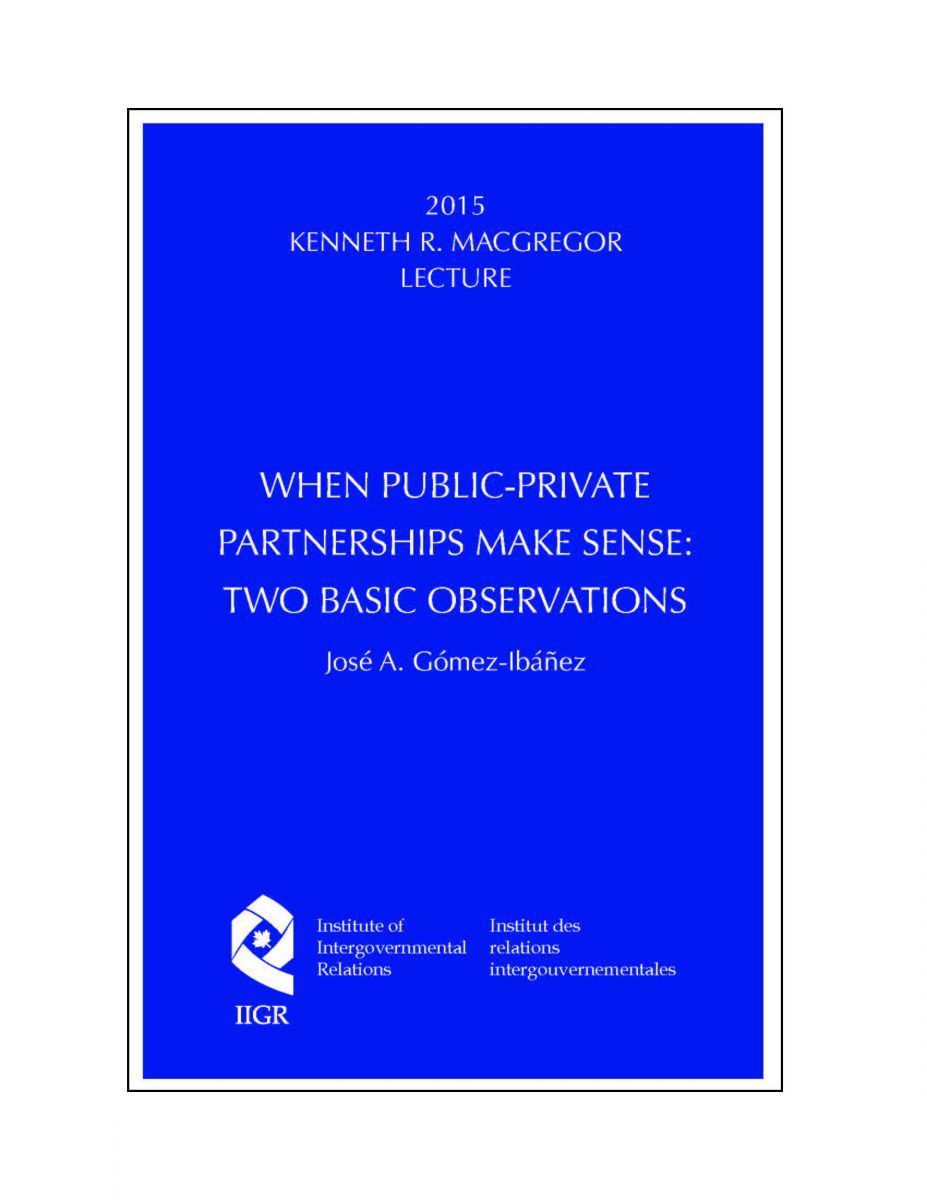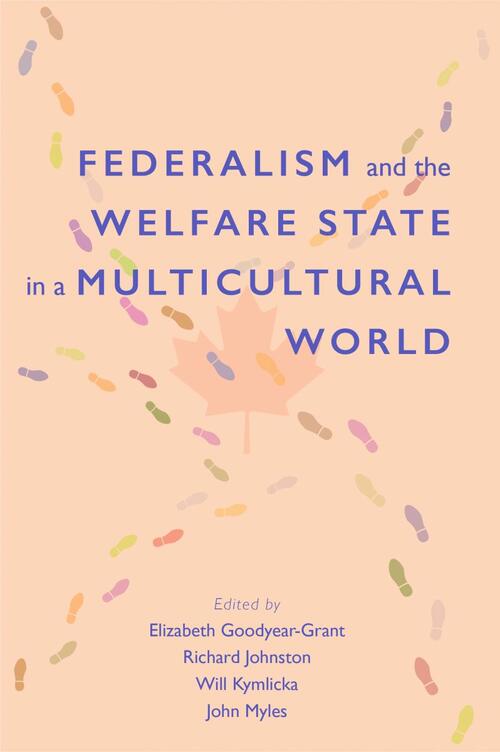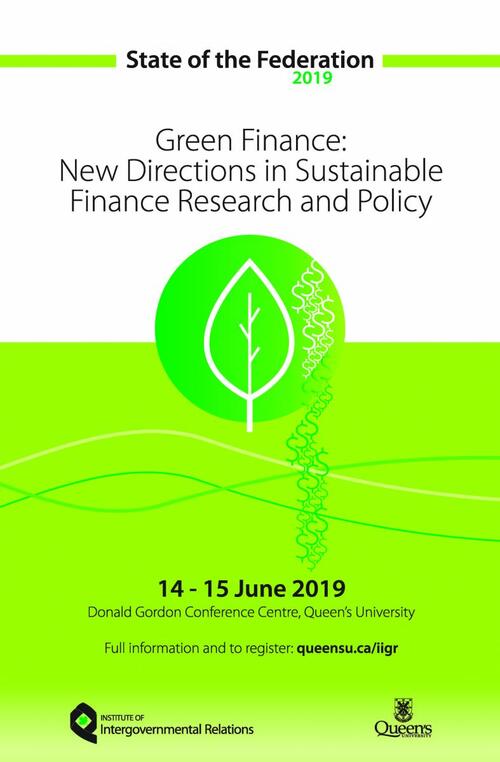When Public-Private Partnerships Make Sense: Two Basic Observations

We’re pleased to announce that the IIGR’s 2015 MacGregor Lecture is now available online.

University Wide
MyQueensU - SOLUS, MyHR and more Office 365 Outlook on the web - Email onQ Library eReserves Web ProxyFaculty / School Portals
Business - Program Portals Education - Faculty & Staff Portal Grad Studies - Faculty & Staff Portal Health Sciences - Elentra Law - QLaw Change password / Manage NetID
We’re pleased to announce that the IIGR’s 2015 MacGregor Lecture is now available online.
Date
Wednesday January 16, 2019Location
Room 554 Robert Sutherland HallHolly Ann Garnett
Assistant Professor
Royal Military College
Abstract: The 2015 Canadian federal election saw a record amount of money spent by candidates and parties, even allowing for the longer campaign. Money is required in politics to mobilize and educate voters, but it may become a problem if the sources and recipients of money are not representative of the overall population. This talk explores who gives in Canada, and why it matters.
Bio: Holly Ann Garnett is an Assistant Professor of Political Science at the Royal Military College and a fellow of the Queen’s Institute of Intergovernmental Relations. Her research examines electoral integrity, including the role of election management bodies, registration and voting methods, election technologies, civic literacy and campaign finance. She is a co-convener of the Electoral Management Network, and contributes to the Electoral Integrity Project.
Date
Monday February 4, 2019Location
The University Club, Queen's University, 168 Stuart Street
RSVP below at
Web Link
iigr@queensu.ca
613 533 2080
Available from McGill-Queen's University Press
Table of Contents [PDF 137KB]
Introduction [PDF 423KB]
Until the 1990s social policy played an integrative role in Canada, providing a counter-narrative to claims that federalism and diversity undermine the potential of social policy. Today, however, the Canadian model is under strain, reflecting changes in both the welfare state and the immigration-citizenship-multiculturalism regime.
Federalism and the Welfare State in a Multicultural World illustrates that there are clear trends that, if unchecked, may exacerbate rather than overcome important social cleavages. The editors argue that we are at a crucial moment to re-evaluate the role of social policy in a federal state and a multicultural society, and if federalism and diversity challenge traditional models of the nation-building function of social policy, they also open up new pathways for social policy to overcome social divisions. Complacency about, or naive celebration of, the Canadian model is unwarranted, but it is premature to conclude that the model is irredeemably broken, or that all the developments are centrifugal rather than centripetal.
Social policy is integral to mitigating divisions of class, region, language, race, and ethnicity, and its underlying values of solidarity and risk-sharing also make it a critical mechanism for nation-building. Wheth
Date
Wednesday April 17, 2019Location
George Teves Dining Room, University ClubProvincial revenues have become far more volatile in the wake of the global financial crisis. How should Canadians mitigate and cope with provincial revenue shocks? Should the federal government enhance nationwide insurance? Should the provinces self-insure and limit provincial revenue volatility themselves? And how do we design stabilization policies that voters will support? This workshop will bring together economists, political scientists and policy experts to explore these and other issues related to the stabilization of provincial revenues. It will also discuss possible paths for normative, political and policy research.
Edited by Chrisitan Leuprecht, Mario Kölling and Todd Hataley
Start Date
Sunday June 14, 2020End Date
Monday June 15, 2020Time
12:00 pm - 12:00 pmLocation
Donald Gordon Conference Centre, Queen’s University
The 2015 Paris Agreement represented the commitment of 197 nations to limit global warming to no more than 2°C, setting climate resilience and clean growth as one of the most influential multi-level governance opportunities of the 21st century. This set a new direction for even the world’s most progressive economies, requiring a sea of change in the interaction between rapid technological innovation, international policies, consumption patterns, and investment behaviors. Canada remains committed to the Paris Agreement as outlined in the 2016 Pan-Canadian Framework on Clean Growth and Climate Change, which prescribes a concerted focus to translate climate goals into transformative economic policies and sustainable financial practices. It is universally accepted that finance plays a critical role in achieving the transition to a clean economy, and that it will require significant collaboration and governance co-ordination between private and public financial institutions, and with policy makers. The quest for energy and natural resources in Canada can be quenched through a clear path of transformations in the financial sector. Canada has the chance to become a world leader in showing that low-carbon-economy bears incredible economic and societal opportunities. In this evolving global economy, businesses, insurance companies, banks, pension funds, mutual funds, academia, not-for-profit, and government institutions must have the knowledge about financial risks of stalling action around climate change, and recognize that sustainability is crucial to Canada’s long-term success.
This conference serves as an ideal opportunity to engage leaders from academics, civil society, financial industry and government to share interests, present new research ideas, reflect on multi-level governance trends, and discuss current and challenging issues in sustainable finance. Organized by Dr. J. Andrew Grant (Department of Political Studies) and Dr. Sean Cleary (Smith School of Business), the conference will bring experts from these sectors to Queen’s University in order to disseminate and exchange such insights with fellow participants as well as the Queen’s community and public. Ultimately, the goal of the conference is to serve as a platform for building new research collaborations aimed at contributing to the transition of Canada’s financial system to one in which sustainable growth is engrained in everyday policy decisions and business practices.
Introduction [245KB]
Table of Contents [387 KB]
How should Canadians mitigate and cope with severe shocks to provincial revenues? Should the federal government enhance nationwide insurance? Should the provinces limit and insure against provincial revenue volatility themselves? And how do we identify useful and politically acceptable policy solutions?
IIGR research fellow Kyle Hanniman wrote an op-ed on 9 April 2020 for the Financial Post about the challenges provincial borrowers are facing in long-term bond markets and what the Bank of Canada (BoC) could do about it. Including provincial bonds in the BoC's new quantitative easing program is one option worth exploring, he argues.
In a joint report between the Institute of Intergovernmental Relations in the School of Policy Studies at Queen’s University and the Macdonald-Laurier Institute titled “Fiscal Fairness: How Equalization Failed Alberta in its Time of Need and How to Fix It,” authors Thomas J. Courchene and Teresa M. Courchene examine the problems inherent in the current equalization formula and the solutions that are on the table to correct the imbalance facing Alberta.